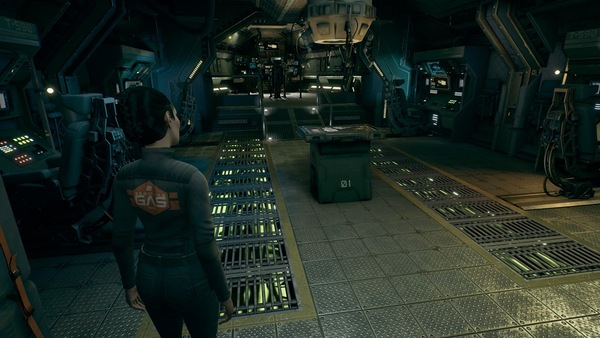The Expanse: A Telltale Series Rejuvenates Old Formula, Sets Marker For Future
The Expanse: ATS’ best accomplishment is to provide a way to interact with a universe with which one might already be familiar. Karan Pradhan parses its implications for the future of entertainment.

Last Updated: 04.32 PM, Sep 01, 2023
THE television show The Expanse (based on the series of novels by James SA Corey) has been around since 2015 and completed six seasons back in 2022. Depicting a world a couple hundred years in the future where Earth and the military industrial complex of Mars are on a warpath, the series is available on Prime Video.
As of 24 August, three episodes (out of five) of The Expanse: A Telltale Series (The Expanse:ATS) had dropped on PlayStation, Xbox and PC, and brought some interesting implications for entertainment in the near future. Before we get into all that, however, it’s worth briefly revisiting what Telltale, in its original avatar, did for narrative adventures and storytelling.
A Brief History

After humble beginnings in the mid-2000s, it was in 2010 that the studio began to acquire the rights to major television/film franchises and build interactive narrative adventures based on them. A cursory run through their titles gives us such names as Law and Order, Jurassic Park, The Walking Dead, Game of Thrones, Batman, Guardians of the Galaxy and so on. Relying on simple mechanics (basic exploration, timed button presses or swipes and dialogue choices), the games gave all hues of gamers (the hardcore, the casual and complete n00bs) an accessible way to immerse themselves in universes that traditionally belong to other media.
And with its episodic structure, players were given bite-size chapters over time — allowing them to ruminate over consequences, do multiple playthroughs that would set up different scenarios or both. While the wait between episodes may have verged on the interminable in some cases (Game of Thrones, for instance), it was a structure that harked back to a simpler time, a time before content was made to be “binged”. More importantly, it worked to create and sustain suspense, and keep players coming back for more.

Over time, the original Telltale ran out of steam and closed up shop under most ignominious circumstances. The brand — as opposed to the original studio — was revived under new management (LCG Entertainment) in 2018. And following a remaster of two seasons of Batman titles made by the original Telltale, The Expanse would be its first new offering (in conjunction with Deck Nine Games). Which is where we came in.
What Is The Expanse: ATS All About?
Set some time prior to the events depicted in the television show, the game thrusts you into the magnetic boots of Camina Drummer — the second-in-command officer onboard the scavenger ship Artemis. What becomes very quickly apparent is how far Telltale games have come along since right before the original operation folded. High production values, smooth controls, solid cinematography and mo-cap, fairly impressive 3D navigation through zero gravity space, interesting gameplay loops and an absence of glitches build nicely on the largely solid voice acting work.

‘Largely solid’ because while Cara Gee and Shohreh Aghdashloo reprise their television roles as Camina Drummer and Chrisjen Avasarala respectively, the equally distinctive and unique voice of Jared Harris (Anderson Dawes) is missing. This, however, remains a minor quibble.
Overall, The Expanse: ATS’s greatest accomplishment is to provide a way to interact with a universe with which one might already be quite familiar. And this is where it gets really exciting in terms of what the future holds.
A Demand For Greater Interactivity

Streaming services are no strangers to interactivity. Leaving aside how your viewing habits influence the way the sort of recommendations the algorithm makes (a very fundamental form of interaction), Netflix’s Bandersnatch, the Black Mirror standalone that dropped at the very tailend of 2018, is probably the most prominent example.
At present, the streaming service is home to interactive adventures based on Puss in Boots, Man vs Wild, Boss Baby, Unbreakable Kimmy Schmidt, a retired WWE legend and more. There are two things to note here: The first is that all of these titles are very much in the vein of the FMV-driven ‘choose your own adventure’ games of yore. For the uninitiated, these are videos where your input (or choices) trigger a different scene, and tell you a somewhat different story. And the second is that they appear to have some traction with subscribers considering the fact that the number of titles seems to be growing.

After years of providing wall-to-wall content that subscribers could only passively consume, it’s unsurprising that streaming giants are now looking to expand in another space. While Amazon Games is still focussing on conventional games, Netflix’s foray into gaming in November 2021 is the one to watch in this regard. Kicking things off with a couple of Stranger Things games, the Netflix mobile games section features a mix of tie-in games (based on Too Hot to Handle and The Queen’s Gambit, for instance) and conventional ones (whether strategy, action or puzzle games).
Much like Google Play or the Apple App Store, the performance of the games depends on your mobile device’s ability to play them. Considering the rate at which mobile phones and tablets are ramping up increasingly impressive specifications and the fact that Telltale games used to be playable on mobile, it stands to reason that titles like The Expanse: ATS could soon find themselves on platforms like Netflix Games. After all, titles like TMNT: Shredder's Revenge, Kentucky Route Zero, Raji: An Ancient Epic and Twelve Minutes that began their lives on consoles and PC, are now available on Netflix.

Where Do We Go From Here?
Studios like Deck Nine, Don't Nod and Night School Studio are just a handful of those that craft narrative adventures that are accessible to both gamers and non-gamers alike. It’s hard not to imagine these entities at the forefront of the effort to create playable versions of television and film universes in the future. That Netflix is considering this route seems evident in its acquisition of Night School Studio (responsible for developing the found phone game Mr. Robot:1.51exfiltrati0n that was published by Telltale).
With the sheer petabytes and even exabytes of content available to be consumed passively on streaming platforms, a tipping point is on the horizon. A disruption in how we entertain ourselves is inevitable. That’s where interactive entertainment — particularly of the sort that doesn’t require immense powers of coordination, concentration and hours of practice to git gud — comes in, and it’s where, in this writer’s view, streaming is set to go next. The first stop on that journey is Netflix testing its games on TVs and computers in select markets.
